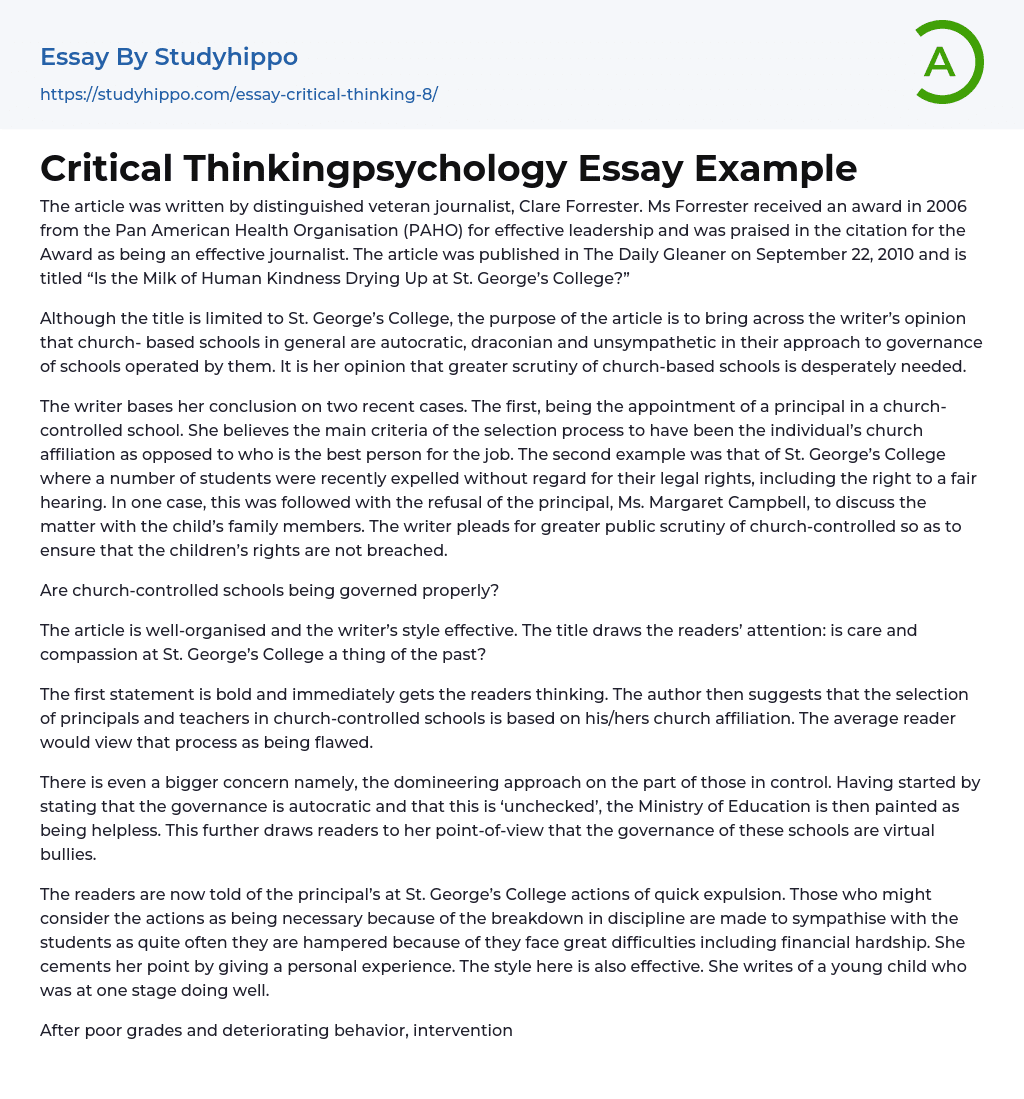The recognized experienced journalist, Clare Forrester, wrote the article. In 2006, she was distinguished with an award from the Pan American Health Organisation (PAHO) for her adept leadership skills and was praised for her effectiveness in journalism. The article was showcased by The Daily Gleaner on September 22, 2010, with the title "Is the Milk of Human Kindness Drying Up at St. George’s College?"
Although the spotlight appears to be only on St. George's College, the writer's primary aim is to present her opinion that educational institutions managed by churches often exhibit strict, harsh and unsympathetic administrative approaches. She asserts that there is an urgent necessity for enhanced supervision of these church-associated schools.
The author shapes her deductions around two recent incidents. The first revolves around the appointment of a headmaster in a religion-governed school. She perc
...eives the prime determinant of choosing the candidate to be their religious association, rather than their competency for the role. The second instance is related to St. George’s College where several students faced expulsion, overlooking their lawful entitlements including the right to a just trial. Notably, this included a situation where Ms. Margaret Campbell, the headmaster, declined to engage in a discussion about the issue with the student's relatives. The author appeals for greater public examination of religion-led schools to ensure non-violation of children's rights.
Is the management of church-run schools appropriate?
The piece is structured logically and the author exhibits an engaging stylistic approach. The headline effectively captures the readers' interest: does St. George's College still foster an environment of care and compassion?
The initial declaration is strong and instantl
stimulates the audience's thought process. The writer implies that the choice of headmasters and educators in faith-based educational institutions relies on his/her religious association. Most readers would regard this approach as faulty.
A larger worry is the aggressive posture of individuals in power. Beginning by declaring the governance as despotic and 'unchecked', the Ministry of Education is subsequently portrayed as defenseless. This compels readers to align with her standpoint that the administration of these schools effectively acts like bullies.
Information about the principal at St. George's College enforcing swift expulsions is conveyed to the readers. Those who may believe these measures are essential due to loss of discipline, are inclined to empathize with the students who frequently struggle, particularly under financial distress. The author strengthens her argument by recounting a personal anecdote. She mentions an instance of a young child who was previously performing well, solely to demonstrate the potency of her style.
When faced with academic struggles and increasing misbehavior, assistance was obtained from a respected psychologist confident in their ability to reform the child. This action was quickly succeeded by the rigid and insensitive approach utilized by the school headmaster. Such an account tends to prompt compassion from regular readers. She expressed that she garnered understanding from the Ministry of Education. While tactfully acknowledging church-affiliated schools' part in education, possibly to avoid alienating their supporters, she has acknowledged their influence on learning institutions. Her writing connects with a broad spectrum of readers.
The technique of Ms. Campbell is marked by subtle yet authoritative and convincing language. For example, she is depicted as an "intensely connected Catholic", while her time
as principal is termed as her "tenure." The story of a child is described as "the plight of a specific boy" who was definitely not past redemption," but unfortunately, his head did not hold this view. The school comes across as "the powerful Roman Catholic institution" that shows resolution. Lastly, the child is recognized as a "youthful soul."
Despite its articulate presentation, the closing argument lacks a solid foundation due to reliance on overgeneralization. Countless church-affiliated educational institutions exist, and using St. George's College as the only example does not suffice. To make her conclusion more credible, additional examples should have been presented. The critiques expressed in the piece were not exclusive to St. George's College as indicated by the title, and making broad generalizations - a clear intention revealed by the opening and concluding paragraphs - is unjustified.
- Academia essays
- Higher Education essays
- Language Learning essays
- Studying Business essays
- Education System essays
- Study essays
- First Day of School essays
- Scholarship essays
- Pedagogy essays
- Curriculum essays
- Coursework essays
- Studying Abroad essays
- Philosophy of Education essays
- Purpose of Education essays
- Brainstorming essays
- Educational Goals essays
- Importance Of College Education essays
- Brown V Board of Education essays
- The Importance Of Higher Education essays
- Online Education Vs Traditional Education essays
- Academic And Career Goals essays
- Academic Integrity essays
- Brown Vs Board Of Education essays
- Distance learning essays
- Technology in Education essays
- Vocabulary essays
- Writing Experience essays
- Importance of Education essays
- Early Childhood Education essays
- Academic Degree essays
- Academic Dishonesty essays
- School Uniform essays
- Academic writing essays
- Cheating essays
- Bachelor's Degree essays
- MBA essays
- College Life essays
- Grade essays
- Diploma essays
- Phonology essays
- Sentence essays
- Filipino Language essays
- Pragmatics essays
- Millennium Development Goals essays
- History Of Education essays
- Graduate School essays
- Middle School essays
- School essays
- Special Education essays
- University essays




